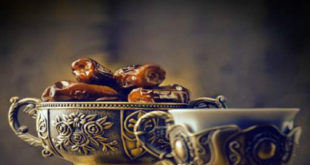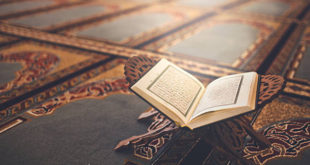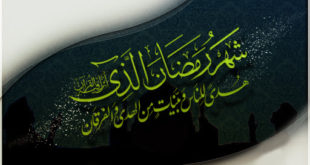
Sleep is one of the basic needs of every person, just as eating and drinking are basic needs. Allah Ta‘ala makes mention of the great bounty of sleep in the Qur’aan Majeed saying:
وَّجَعَلْنَا نَوْمَكُمْ سُبَاتًا ۙ﴿۹﴾
And We made sleep a means of rest for you.[1]
In another verse, Allah Ta‘ala says:
وَهوَ الَّذِیۡ جَعَلَ لَکُمُ الَّيْلَ لِبَاسًا وَّالنَوْمَ سُبَاتًا وَّجَعَلَ النَّهارَ نُشُورًا ﴿۴۷﴾
He is the One who has made the night for you as clothing (which covers you with peace and serenity), and has made sleep a means of rest (for you), and has made the day a means of revival.[2]
There are various sunnats and aadaab (etiquettes) in regard to sleeping. Among these is reciting the masnoon surahs and duas and sleeping in the state of wudhu.
The one who recites the masnoon surahs and duas will be protected from the evil of the shayaateen and will be saved from seeing bad dreams. If one passes away, his last action will be the remembrance of Allah Ta‘ala and he will be blessed with the rank of a martyr on account of sleping in the state of wudhu.[3]
At the time of sleeping, one should make the intention that he is fulfilling this need in order to refreshen himself to be able to fulfill the ibaadah of Allah Ta‘ala upon awakening. Similarly, he is sleeping to fulfill the right of his body, as Allah Ta‘ala has given his body a right over him.
Hence, by one carrying out these sunnats before sleeping, one will not merely be fulfilling his need of sleep – but will also be acquiring reward as his sleep will become an act of ibaadah.
Sunnats and Aadaab of Sleeping
1. After the Esha Salaah, do not while away your time in idle conversation. Instead, try to sleep as early as possible so that you may be able to wake up for Tahajjud Salaah and perform your Fajr Salaah on time. However, if there is a valid need to remain awake e.g. participating in a Deeni program, discussing Deeni masaa’il, an important mashwarah, etc. then it will be permissible for you to engage in such discussions after Esha.[4]
عن أبي برزة أن رسول الله صلى الله عليه وسلم كان يكره النوم قبل العشاء والحديث بعدها (صحيح البخاري، الرقم: ٥٦٨)
Hazrat Abu Barzah (radhiyallahu ‘anhu) reports that Rasulullah (sallallahu ‘alaihi wasallam) disliked that a person sleep before Esha, and engage in discussions after Esha (in the case where there is no need).
عن عمر بن الخطاب قال:كان رسول الله صلى الله عليه وسلم يسمر مع أبي بكر في الأمر من أمر المسلمين وأنا معهما ( سنن الترمذي، الرقم: ١٦٩، وقال: حديث عمر حديث حسن)
Hazrat Umar (radhiyallahu ‘anhu) reports, “Rasulullah (sallallahu ‘alaihi wasallam) engaged in discussions after Esha with Abu Bakr (radhiyallahu ‘anhu) regarding a matter concerning the Muslims while I was also present.”
عن عائشة زوج النبي صلى الله عليه وسلم قالت: ما رأيت رسول الله صلى الله عليه وسلم نائما قبل العشاء، ولا لاغيا بعدها: إما ذاكرا فيغنم وإما نائما فيسلم
عن عائشة زوج النبي صلى الله عليه وسلم قالت: السمر لثلاثة: لعروس أو مسافر أو متهجد بالليل (مسند أبي يعلي الموصلي، الرقم: ٤٨٧٨، ٤٨٧٩)[5]
Hazrat Aaishah (radhiyallahu ‘anha) reports that she had never seen Rasulullah (sallallahu ‘alaihi wasallam) sleep before Esha, nor did she see him engage in idle discussions after Esha. He would either engage in the remembrance of Allah Ta‘ala after Esha, thereby reaping the rewards of the Hereafter and becoming successful, or he would go to sleep, thereby saving himself (from being engaged in things of no benefit). Hazrat Aaishah (radhiyallahu ‘anha) further says, “Engaging in talks after Esha is permissible for three groups of people; for a married couple, a traveller (to assist him in remaining awake and completing the journey) and one who intends performing salaah during the night.”
2. It is sunnah to sleep in the state of wudhu.[6]
عن معاذ بن جبل قال: قال رسول الله صلى الله عليه وسلم: ما من عبد بات على طهور ثم تعار من الليل فسأل الله شيئا من أمر الدنيا أو من أمر الآخرة إلا أعطاه (سنن ابن ماجة، الرقم: ٣٨٨١)[7]
Hazrat Mu’aaz bin Jabal (radhiyallahu ‘anhu) reports that Hazrat Rasulullah (sallallahu ‘alaihi wasallam) said, “The one who sleeps in the state of wudhu, and thereafter wakes up during the night (or turns from one side to the other), and asks Allah Ta‘ala for anything of this world or the Hereafter, Allah Ta‘ala will surely grant it to him.”
3. Before sleeping, you should dust the bed, as there may be some harmful insect etc. in the bed.
عن أبي هريرة قال: قال النبي صلى الله عليه وسلم: إذا أوى أحدكم إلى فراشه فلينفض فراشه بداخلة إزاره فإنه لا يدري ما خلفه عليه (صحيح البخاري، الرقم: ٦٣٢٠)
Hazrat Abu Hurairah (radhiyallahu ‘anhu) reports that Hazrat Rasulullah (sallallahu ‘alaihi wasallam) said, “When any one of you retires to bed, then he should dust the bed with the inner-part of the tail of his lungi. The reason is that one is unaware of what could have entered his bed in his absence (e.g. insects, etc.).”
4. Cleanse your mouth by using the miswaak before sleeping.[8]
عن محرر بن أبي هريرة عن أبيه قال:كان النبي صلى الله عليه وسلم لا ينام ليلة ولا ينتبه إلا استن ( المعجم الأوسط للطبراني، الرقم:٧٩٨٠)[9]
Hazrat Abu Hurairah (radhiyallahu ‘anhu) reports that whenever Rasulullah (sallallahu ‘alaihi wasallam) retired to bed at night or awoke during the night, he would use the miswaak.
5. It is mustahab to apply surmah before sleeping.[10]
عن ابن عباس أن النبي صلى الله عليه وسلم قال:اكتحلوا بالإثمد فإنه يجلو البصر وينبت الشعر وزعم أن النبي صلى الله عليه وسلم كانت له مكحلة يكتحل بها كل ليلة ثلاثة في هذه وثلاثة في هذه ( سنن الترمذي، الرقم: ١٧٥٧، وقال: حديث ابن عباس حديث حسن)
Hazrat Abdullah bin Abbaas (radhiyallahu ‘anhuma) reports that Hazrat Rasulullah (sallallahu ‘alaihi wasallam) said, “Apply surmah by using ithmid (a type of surmah), for certainly it cleans the eyes and causes the hair (eyelashes) to grow.” Hazrat Abdullah bin Abbaas (radhiyallahu ‘anhuma) further says that Rasulullah (sallallahu ‘alaihi wasallam) kept a container of surmah from which he used to apply surmah every night. He would apply surmah thrice in the right eye and thrice in the left eye.
[1] سورة النبأ: ٩
[2] سورة الفرقان: ٤٧
[3] مجمع الزوائد، الرقم: ١٤٧٠، وقال: رواه أبو يعلى والطبراني في الصغير وزاد يا بني إذا خرجت من بيتك فلا يقعن بصرك على أحد من أهل القبلة إلا ظننت أنه له الفضل عليك يا بني إن ذلك من سنتي ومن أحيا سنتي فقد أحبني ومن أحبني كان معي في الجنة وفيه محمد بن الحسن بن أبي يزيد وهو ضعيف
قال البوصيري في الإتحاف (الرقم: ٥٤٠): علي بن زيد بن جدعان ضعيف لكن لم ينفرد به علي بن زيد فقد رواه أحمد بن منيع ثنا يؤيد أبنا العلاء أبو محمد الثقفي سمعت أنس بن مالك … فذكره وسيأتي لفظه في آخر كتاب المواعظ إن شاء الله روى الترمذي قطعة منه في الصلاة وأخرى في العلم من طريق أعلي بن زيد
[4] أشرنا إلى أن علة استحباب التأخير في العشاء هي قطع السمر المنهي عنه وهو الكلام بعدها قال في البرهان: ويكره النوم قبلها والحديث بعدها لنهي النبي صلى الله عليه وسلم عنهما إلا حديثا في خير لقوله صلى الله عليه وسلم لا سمر بعد الصلاة يعني العشاء الأخيرة إلا لأحد رجلين مصل أو مسافر وفي رواية أو عرس….. وقال الزيلعي وإنما كره الحديث بعده لأنه ربما يؤدي إلى اللغو أو إلى تفويت الصبح أو قيام الليل لمن له عادة به وإذا كان لحاجة مهمة فلا بأس وكذا قراءة القرآن والذكر وحكايات الصالحين والفقه والحديث مع الضيف والمعنى فيه أن يكون اختتام الصحيفة بالعبادة كما جعل ابتداؤها بها ليمحى ما بينهما من الزلات ولذا كره الكلام قبل صلاة الفجر وتمامه في الإمداد ويؤخذ من كلام الزيلعي أنه لو كان لحاجة لا يكره وإن خشي فوت الصبح لأنه ليس في النوم تفريط وإنما التفريط على من أخرج الصلاة عن وقتها كما في حديث مسلم نعم لو غلب على ظنه تفويت الصبح لا يحل لأنه يكون تفريطا تأمل (رد المحتار ٣٦٨/١)
[5] وقال الهيثمي في مجمع الزوائد (الرقم: ١٧٦١): رجاله رجال الصحيح
[6] والوضوء ثلاثة أنواع … وسنة للنوم على طهارة (تبيين الحقائق ٣/١)
[7] وقال الحافظ في المطالب العالية (٨٧٥/١٣): الحديث بهذا الإسناد حسن لحال شهر بن حوشب
[8] وقال أبو عمر فضل السواك مجتمع عليه لا اختلاف فيه والصلاة عند الجميع أفضل منها بغيره حتى قال الأوزاعي: هو شطر الوضوء ويتأكد طلبه عند إرادة الصلاة وعند الوضوء وقراءة القرآن والاستيقاظ من النوم وعند تغير الفم ويستحب بين كل ركعتين من صلاة الليل ويوم الجمعة وقبل النوم وبعد الوتر (البناية شرح الهداية ٢٠٥/١)
[9] وقال الهيثمي في مجمع الزوائد، الرقم: ٢٥٦٨: وفيه من لم أجد من ذكره وقد رواه أحمد من فعل أبي هريرة وفيه محمد بن عمرو وهو ضعيف مختلف فيه
[10] والأفضل عند النوم اتباعا له عليه الصلاة والسلام، ولأنه أشد تأثيرا، وأقوى سريانا حينئذ، وقال الطيبي: وإنما أبرز الأول في صورة الأمر اهتماما بشأنه، وأنه من السنة المندوب إليها، وأخبر عن الثاني للإيذان بأنه من خير دأب الناس وعادتهم، وجمع بينهما لمناسبة الزينة، يتزين بهما المتميزون من الصلحاء اهـ. وفيه إشعار منه أن الاكتحال ليس بمندوب، وتبعه عصام الدين في شرح الشمائل، وهو مردود لأنه عليه الصلاة والسلام واظب عليه، فإنه كانت له مكحلة يكتحل بها كل ليلة في كل عين ثلاثا، وأمر أحاديث كثيرة: باكتحلوا، وقد صرح أصحاب الشافعي وغيرهم: بأنه يستحب ; فلا وجه لجعله في المباح الذي لا يترتب عليه ثواب (مرقاة المفاتيح ١١٨٧/٣)
 Ihyaaud Deen An Effort to Revive Deen in Totality
Ihyaaud Deen An Effort to Revive Deen in Totality



